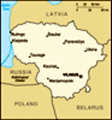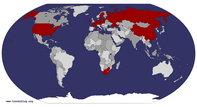Advertisement

 Lost ball
Lost ball
our first baseman looking for a lost ball during the fourth inning of our home game on Saturday. this brush pile is one of many around the complex that has been there for several months. Yesterday I was out at Kaunas Stadium mowing the grass. I really enjoy mowing grass. It gives me time to think, time to be with myself, it is this repetitive yet artistic activity. Back in North Carolina this is the way that I made spending money during the summers—I mowed lawns. I loved it. I remember the summer before my senior year in high school and first year in college I really got into mowing. It was a particularly wet summer, which meant that the grass was growing and so was the lawn-mowing business. I began with two lawns and by the end of the summer I had 15 or 16 different lawns I was taking care of. I was mowing them each almost every week. It was almost like a full-time job. I made more money in that summer than I have in any month playing baseball or dancing or teaching English in China…….
The following summer, anticipating similar success, I wrote up a full-page flyer and upon returning home from college exams, went door to door in Chapel Hill passing out these flyers.
Of the 100 flyers I handed out, I received two responses, and only one

 Still not found....
Still not found....
looking for foul balls is truly a skill.of them in the end asked me to mow their lawn. And I began to understand why, as the weeks went by and the rains did not come. I think I mowed a total of 5 or 6 lawns that summer, each one no more than twice. We were in the middle of a drought--the rain did not fall and the grass simply did not grow.
This is what convinced me that mowing lawns would not be a stable career path.
In Kaunas, Lithuania, mowing lawns is equally poor of a career path choice. But not because of unpredictable rains-- in fact it rains quite a lot in Lithuania-- rather because, as you would notice within minutes of arriving in the country, they do not mow the grass. Anywhere. Only at gas stations and certain new shops will you see the grass mowed—or in some people’s yards. Many folks don’t own lawn mowers, and public spaces and city parks are not neatly manicured as they are in the US (both I think out of economic practicality and because there is no expectation or cultural habit to do so). Apartment complexes and city roads lined with grass are mowed

 Mantas
Mantas
our catcher, joining in on the fun. This ball was never found......... :(only every few weeks, even in the city center. So the result is a very wild-looking landscape even in the middle of the second-largest city in Lithuania (a population of 350,000).
This is great. When I first arrived, it was one little thing that I noticed and was actually really confused about (and somehow bizarrely taken aback by). “Why doesn’t anybody mow the grass??” I would ask myself (and whomever was in the car with me). But this different way has come to grow on me, and as I have learned how important nature is to Lithuanians and their culture, I have come to understand that it is a choice. That grass is wildlife, and they let it grow until it is absolutely necessary to cut it back.
This mentality does not work so well for baseball fields. You cannot play a normal baseball game with knee-high grass, which we have in fact done on more than one occasion in Kaunas. And somebody’s got to mow the grass, so why not me? After all I am the only full-time player and thus I have more time on my hands than anyone else.
I mowed the grass last week with the help of two of the younger players and one dad. It was the first time the grass had been mowed this season. The two younger players spent four hours mowing, assisted by the dad, and then I arrived around lunch time to help out. **let me remind you that this is a full--size baseball field and all we have are two pushmowers.
I mowed for two hours, and then spent about an hour picking up trash around the field, while Algimantas (the dad) continued mowing. I filled six bags with trash. Algimantas told me to just throw the trash bags behind the bleachers where a large pile of trash bags was already accumulating. I was wary of this solution; later in the day I asked Sigitas about this and he confirmed that, indeed, the trash company 'Svara' would be coming later in the week to pick up the trash.
In fact Svara, the trash collection service in Kaunas, is one of our team’s sponsors! One of the younger players’ fathers is the director of Svara in Kaunas, and they often help out with cleaning up the stadium and occasionally donate money to the team. How great is that…….our team’s major sponsor is a trash collection service…….
It is now one week later, and Svara has still not come to pick up steadily growing pile of trash in Kaunas stadium. The bags are still sitting there, and over the past week another six bags’ full of trash have accumulated in the bleachers from folks who come and hang out in the stadium.
This is the perpetuity of the situation in Kaunas. We clean up the stadium, it is full of trash one week later. We dig holes and put steel poles in the ground for our batting cage, and one week later all of the poles are uprooted and half are stolen. We hammer in planks into the aging concrete bleechers to give fans a place to sit, and then a season later half of them have been pulled up and used for who knows what.
When I arrived this season there was no pitcher's rubber on the mound....it had disappeared. Mantas, our catcher, brought another one from his work (made of wood).
It is incredible to me the stark contrast between the realities of baseball in Kaunas and even the realities of baseball in France. In France the guys arrive at the field and preparation for the game involves bringing out the benches for the fans, the scorer’s table, the numbers for the scoreboard….raking the field a bit and maybe watering the mound and home plate.
In Kaunas, we must bring everything out; it is all locked away because the field is open and anyone can come. We bring out the team benches, the scoreboard, the foul poles, home plate and the bases, we fill several bags with trash before each game, we paint the foul lines and batters’ boxes (with sawdust, not real chalk), we put up tall steel poles and drape over it a make-shift net behind home plate to catch at least some of the foul balls and wild pitches.
When running after foul balls, players must not only keep your eye on the baseball but also watch out for the drainage ditch that separates the grass and the concrete just a few feet past the foul line, the soccer goal frame just off the first base foul line, the broken glass that is sprinkled over most of the concrete surface, and the various holes within the concrete itself.
I know i am ranting a bit but I hope it is intriguing....
To give you another example of the bizarre events that interrupt the flow of baseball life in Kaunas: at our Tuesday practice we were taking batting practice off a pitching machine and had to stop several times because children arrived with their bikes and were riding in the outfield. Then a car arrived and parked directly behind home plate (I'm still not sure why), and remember there is no fence, and of course the first foul ball hit directly on the car's hood. A ten-minute dispute ensued which ended in the car finally driving off. Then in the next moment the pitching machine stops working and we realize that someone had shut it off from inside the small weight room underneath the bleachers that is used by some local guys. They were leaving for the day and forgot that we needed power to run our pitching machine. And so we wait again......
And then there is the looking for foul balls. This is a big part of any practice where we are hitting on the field. Finding baseball in the bushes, high grass, and brush around the field is a skill that must be learned by the young baseball players here, just as they must learn how to throw, catch and hit. In fact this skill is equally as important to the survival of baseball, because without baseballs we cannot hold a normal practice.
I say all of this with endearment and love. I love playing here, and I love the guys I play with. I love mowing the field, I love being a part of this group of baseballers, this group of guys. It is not always perfect, but perfection is boring. And it is always exciting to show up once again each season, each week, each practice, to see what's new, what has changed, who is coming to play and who is no longer, and to see what stories will unfold......
Advertisement
Tot: 0.308s; Tpl: 0.012s; cc: 13; qc: 60; dbt: 0.16s; 1; m:domysql w:travelblog (10.17.0.13); sld: 1;
; mem: 1.2mb











Ann
non-member comment
My Favorite!
Will, this is probably my most Favorite entry! Either because I am beginning to think 'mowing of grass' along with 'appreciation of nature ' are two dynamics I have been discovering might be (at least culturally) inherited! And 'trash' and 'change' and 'what adventure/unexpected surprise is next?' You describe it all so beautifully! I chuckle! Love, Mom